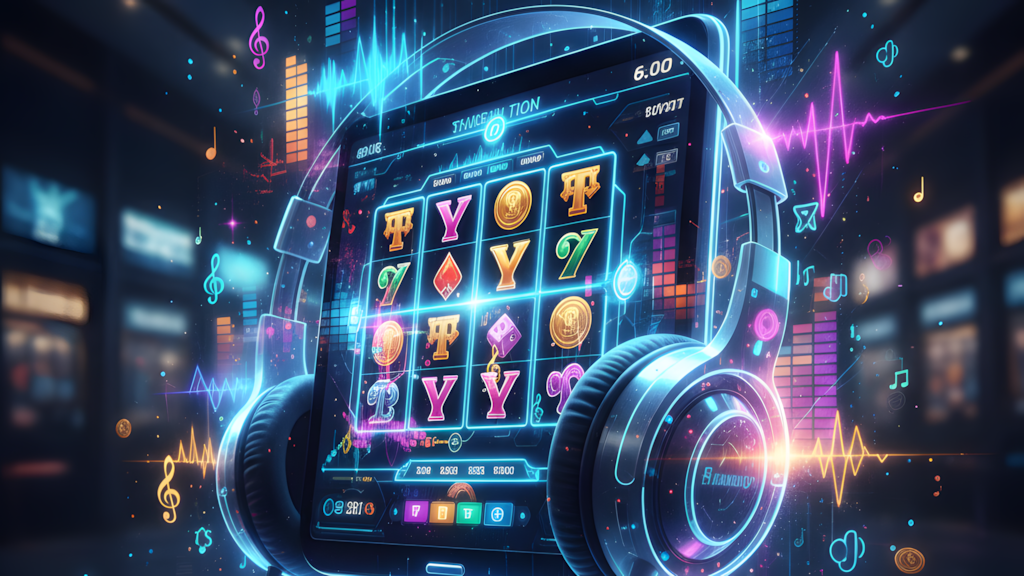In the fast-growing sphere of online gaming, visuals become the focus. With beautiful graphics and detailed user interfaces, considerable attention is paid to what players view. But an equally important but less-mentioned aspect is the strategic application of music and sound. Music in online casinos is a very carefully designed instrument that, instead of being a background, affects the psychology of players, their levels of engagement, and, consequently, business results. This paper will explore all the deep-rooted effects of sound design in the iGaming sector, discuss its psychological processes, how auditory environments have changed over time, and the physical benefits to players and operators.
The Psychology of Sound: More Than Just Ambiance
The effect of music on the human psyche is well-documented. It can influence our moods, cognitive processes, and even cause neurochemical reactions. Online gaming is one of the areas where this psychological attachment is exploited to generate a particular experience.
The Dopamine Connection and the “Flow State”
Among the key psychological impacts of music in games, there is the fact that it can cause dopamine release. This neurotransmitter is linked to pleasure, reward, and motivation. The positive association formed by a celebratory jingle following a large win or the increasing tempo before a bonus round can trigger the reward system of the brain and promote a strong positive association. It is a classic case of Pavlovian conditioning where sound turns into a signal of a gratifying event. This neurochemical similarity to the thrill of the gambling experience itself can precondition players to become more risky and continue playing a game longer.
Other than the mere reward, music is another important element in creating a flow state. It is a mental process in which an individual becomes engrossed in a certain activity that they are unaware of time and even outside factors. In the world of online gaming, a properly designed soundtrack can bring an individual into a state of profound immersion, resulting in a long gaming session and an increased feeling of pleasure. It is a win-win: the players will have a more fulfilling experience, and the operator will enjoy more engagement and time to play.
The Influence of Tempo and Genre on Behavior
The nature of the music, in itself, is an important factor in player behavior. It has been found that tempo directly correlates with the speed of action, specifically.
- Fast Tempo: Fast-paced games such as slots are often accompanied by high-energy music of a fast pace, such as electronic dance music (EDM) or bouncy pop. Such music also raises the level of arousal in a player and makes them gamble faster and with urgency. The starting and finishing beats can get into a trance-like state, reducing the awareness of the players about the time and financial losses.
- Slow Tempo: On the other hand, slower music is intended to encourage a slower and more reflective form of play. Playing a table game such as poker or blackjack would use a relaxed, instrumental soundtrack since players are more likely to pay attention and think about their next step. The slow speed may actually create longer sessions where the players are not as hurried and have a higher chance of going into a flow state.
Various musical styles are also used strategically to suit the theme of the game and the behavior that the players want. Soundtracks within slots, such as thematic soundtracks, can immediately make a slot take a person to ancient Egypt or a tropical paradise. Risk-taking can be enhanced by high-energy rock music, whereas conservative wagering can be promoted by soothing classical music.
The Evolution of Sound in Casino Entertainment

Sound has played a significant role in the casino scene, starting with the mechanical ringing of bells on ancient slot machines, and progressing to the advanced digital soundscapes present today.
From Land-Based Casinos to the Digital Realm
Traditional land-based casinos mostly relied on music and sound to create a lively atmosphere. The sound of the coins, the sound of the bells, and the overall buzzing of the gaming floor were all the sensory experience. Gradually, the casinos started incorporating live shows and background music in order to make it more entertaining and appeal to a broader audience.
With the introduction of online casinos, there was a new challenge: how to recreate such a complete sensual experience in the absence of a physical space. Music and sound design were soon understood to be the key designers of this virtual world by operators. They started creating the sound effects of a real casino, such as the shuffle of the cards, the spinning of the virtual reels, and so on, in a meticulous way to fill the gap between the online and the physical gambling experience.
The Strategic Shift: Sound as a Core Gameplay Mechanic
The role of music in online gaming has changed from a path to the overall atmosphere in the gaming, instead of being an actual part of the game. Sound effects are accurately matched with in-game happenings. Another winning received a unique jingle, an almost winning received a build-up tone, and a bonus round was indicated by a shift in the music.
This further integration enables more dynamic and fine-tuning of the player behavior. Positive behavior is reinforced by the immediate, eternal auditory feedback and makes the abstract game mechanics a physical, emotionally filled experience. This is because sound is an essential part of the interaction cycle, which will lead to greater involvement and support of intended behavior.
Tailoring Sound for Specific Game Types
Different online casino games require distinct auditory environments to optimize the player experience.
Slots: The Dynamic Auditory Playground
There is perhaps no online casino game that is as sonically abundant as slots. Their soundtracks are dynamic and are tailored to their subjects to make the sound exciting. It is usual to have the music get louder as a gamer approaches a bonus round or massive win, creating suspense.
- Tension-Building Cues: The sound of the reels turning in a rhythmical manner, as well as the tonal changes as they slow down, are meant to create suspense.
- Celebratory Jingles: The snappy, catchy songs that are played following a victory are very useful reward indicators. They cause a good reaction and make players continue spinning.
- Thematic Soundtracks: Alternative music that is adaptable to the theme of a game is a unifying and immersive experience, and one that makes the game immediately identifiable and memorable.
Table Games: Focus Over Flash
Table games such as poker and blackjack, unlike the high-energy sound of slots, need a less energetic sound atmosphere. This is aimed at advancing concentration and strategic thinking.
- Mellow Instrumental Music: This kind of music is applied to produce a relaxed mood. It also gives new players a more relaxed feeling, and the seasoned players have the time to focus on their strategy.
- Non-Distracting Sounds: In internet poker, instrumental music with less or no vocals is preferred by a large number of gamblers. No lyrics are important so that one is not distracted in making high-stakes decisions.
- Live Dealer Ambiance: In the case of live dealer games, sound design is aimed at the experience of a real casino, but must not distract. The feeling of presence and immersion are promoted with the help of light ambient music and the natural sound of the game (card shuffles, wheel spins).
Business Outcomes: How Sound Drives Revenue and Retention

The strategic deployment of music and sound is not just about making games more enjoyable; it has a direct and measurable impact on business success.
Increased Engagement and Player Loyalty
The quality of soundscapes is one of the main motivators of immersion and emotional attachment of players. It is also true that a game that has a catchy soundtrack will be replayed, and thus there will be more session time and player lifetime value. Music can also be a strong differentiation and brand-building tool in a very competitive market. It creates a feeling of familiarity and a positive emotional connection to the players and makes them want to go back, which is much cheaper than getting new players.
Influencing Risk and Decision-Making
The fact that music has a slight impact on the risk propensity of a player is a major strategic benefit. Controlling the tempo and genre, operators are able to subliminally direct players toward a preferred type of play. The music can be fast, resulting in quicker and more impulsive bets, or it can be slow, which causes a more conservative style of betting. This demonstrates the strength of music as a psychological weapon, which could unconsciously affect the behavior of the players and, consequently, their profitability on the platform.
The Ethical Imperative of Responsible Sound Design
Although the business gains of strategic sound design are obvious, the strength of the sound design is accompanied by an ethical duty. The fact that music can change the mood of a player, make him or her feel time differently, and promote the idea of risk-taking behavior should be paralleled with the need to ensure that the player remains responsible in playing. The operators should make sure that their sound design decisions do not contribute to problematic gambling practices among susceptible persons accidentally. This implies rigor mortis and adherence to the well-being of players, as well as commercial interests.
The Future of Audio in iGaming: Personalization and Innovation
The future of online casino audio is set to be even more dynamic and personalized.
AI-Driven Personalized Soundtracks
Consider a soundtrack that can fit in real-time to your mood. Sound systems powered by AI might play relaxing music when having a losing streak or a motivating song when the player is on a winning streak. Such a high degree of hyper-personalization would make the experience of each player truly unique and immersive, which would be much more engaging and retain better.
Integration with Emerging Technologies
With an increasing shift towards more immersive technologies such as the virtual reality (VR) and augmented reality (AR) industry, enhanced audio will become even more significant. The use of spatial audio that creates the impression of sound in various directions will be critical in creating an authentic and interactive virtual casino. This will bring the feeling of presence and immersion to a whole new level, as the virtual experience would become something real.





















